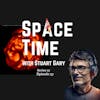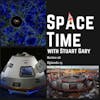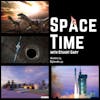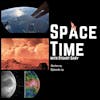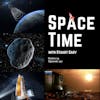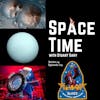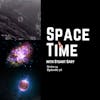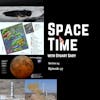A “Hot Jupiter’s” Dark Side Revealed in Detail for First Time
SpaceTime Series 25 Episode 30
*A “hot Jupiter’s” dark side is revealed in detail for first time
Astronomers have obtained the clearest view yet of the perpetual dark side of a hot Jupiter exoplanet that is “tidally locked” to its host star. The...
*A “hot Jupiter’s” dark side is revealed in detail for first time
Astronomers have obtained the clearest view yet of the perpetual dark side of a hot Jupiter exoplanet that is “tidally locked” to its host star. The observations reported in the journal Nature Astronomy have been combined with measurements of the planet’s permanent day side to provide the first detailed view of an exoplanet’s global atmosphere.
*New measurement for the mass of the Neutrino
Scientists have determined the mass of the neutrino at less than 0.8 electron volts. The findings reported in the journal Nature physics will help sciences understanding of the Universe.
*New weather satellite rockets into orbit
America's newest weather satellite has successfully reached geostationary orbit. The mission flew aboard a United Launch Alliance Atlas V rocket from Space Launch complex 41 from the Cape Canaveral Space Force Base in Florida.
*March SkyWatch
The March equinox, the constellations Taurus the bull, Leo the lion and the Gemini twins Pollux and Castor, And don’t forget March 14 is pi day and Albert Einstein’s birthday are among the many features this month on Skywatch…
Listen to SpaceTime on your favorite podcast app with our universal listen link: https://spacetimewithstuartgary.com/listen
For more SpaceTime and show links: https://linktr.ee/biteszHQ
If you love this podcast, please get someone else to listen to. Thank you…
To become a SpaceTime supporter and unlock commercial free editions of the show, gain early access and bonus content, please visit https://bitesz.supercast.com/ . Premium version now available via Spotify and Apple Podcasts.
For more podcasts visit our HQ at https://bitesz.com
Your support is needed...
SpaceTime is an independently produced podcast (we are not funded by any government grants, big organisations or companies), and we’re working towards becoming a completely listener supported show...meaning we can do away with the commercials and sponsors. We figure the time can be much better spent on researching and producing stories for you, rather than having to chase sponsors to help us pay the bills.
That's where you come in....help us reach our first 1,000 subscribers...at that level the show becomes financially viable and bills can be paid without us breaking into a sweat every month. Every little bit helps...even if you could contribute just $1 per month. It all adds up.
By signing up and becoming a supporter at the $5 or more level, you get immediate access to over 240 commercial-free, double, and triple episode editions of SpaceTime plus extended interview bonus content. You also receive all new episodes on a Monday rather than having to wait the week out. Subscribe via Patreon or Supercast (you get a month’s free trial with Supercast to see if it’s really for you or not)....and share in the rewards. Details at Patreon www.patreon.com/spacetimewithstuartgary or Supercast - https://bitesznetwork.supercast.tech/
Details at https://spacetimewithstuartgary.com or www.bitesz.com
For more SpaceTime visit https://spacetimewithstuartgary.com (mobile friendly).
For enhanced Show Notes including photos to accompany this episode: The Astronomy, Space, Technology & Science News Podcast.
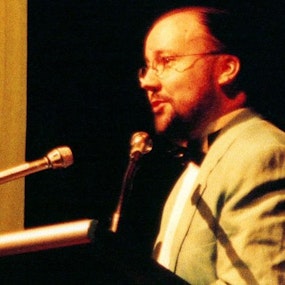
Jonathan Nally
Editor Australian Sky & Telescope Magazine
Our editor, Jonathan Nally, is well known to members of both the amateur and professional astronomical communities. In 1987 he founded Australia’s first astronomy magazine, Sky & Space, and in 2005 became the launch editor for Australian Sky & Telescope. He has written for other major science magazines and technology magazines, and has authored, contributed to or edited many astronomy, nature, history and technology books. In 2000 the Astronomical Society of Australia awarded him the inaugural David Allen Prize for Excellence in the promotion of Astronomy to the public.
New to SpaceTime with Stuart Gary?
Here are some great episodes to start with.







































